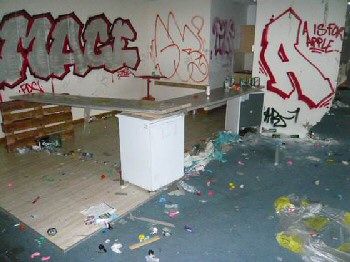|
Squatting solutions for
UK's landlords

WHAT you can legally do as a property
owner or landlord to remove squatters from your commercial property, advises
Simon Broadbent, CEO of Secure Empty Property.
Commercial properties have been put exponentially at risk from squatters since
2012, when the law making squatting in residential properties a criminal offence
was put into effect. Now, while residential property owners are able to legally
keep squatters out of their buildings, commercial property owners have had to
deal with an influx of unauthorised occupiers as they cannot as easily get rid
of them.
Currently, squatting in non residential buildings is still a Civil Law matter
rather than a criminal 1, which means that the property owner has to go to court
in order to have the issue resolved. If you obtain a summary possession order,
which costs ₤175 to just issue the application, you can expect to take back
possession of the property from 10 days to 4 weeks. This timescale takes
into account Court hearings and Bailiff Warning and enforcement, although if
there is risk of damage to the property, this process will be conducted via the
High Court, which is much quicker.
If you're looking for a quicker turnaround, then you can obtain an:-
'Interim Possession Order,' but it can only be used within 28 days of you becoming aware
of the squatters occupying your property. An IPO can be more complex as it is
only an interim measure while waiting for a hearing, and the application may
even be overturned following the hearing. It is also reliant on specific
timescales and other technicalities, which can derail the entire application and
process if not followed to the letter, and is also a more expensive procedure
for only being potentially faster than a summary possession order.
However, the Police can remove unauthorised occupiers if they have committed
criminal damage, for instance by forcibly breaking into the property or damaging
the inside in some way. While squatting in the property is not a crime, damaging
it is. The Police can also take action if the unauthorised occupants have stolen
from the property, used any of the utilities without permission, dumping waste
otherwise known as fly tipping, and of course ignoring Court Notices to leave, if
your court order goes through.
In order to avoid damage to your property by squatters breaking in, and in order
to avoid costly legal fees in Court applications and hiring a lawyer, we'd
recommend taking preventative measures. Investing in protecting your commercial
property from being entered, either by force or through lack of security, can
save you money and grief later on down the line. Our services include boarding
up properties to prevent entry or access with security doors and screens, alarms
and CCTV cameras, and even manned security, to name, but a few of our
specialties.
Secure Empty Property Chief Executive Simon Broadbent says:- "Squatting is
a real headache for landlords. Not just the cost of their eviction, but the
damage they cause whilst in occupation and the hold up to the owners plans for
re-development or disposal. We urge property managers to mitigate these risks
before they happen."
|
